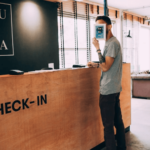Summer officially started and everyone is now looking forward to their vacation – including social media managers. Social media is now a key element of hotel marketing, and it’s easy to see why.
Thanks to the team at Engagement Labs for this great overview of top hotels on social media!
People love to post pictures and comments on Facebook about the hotels and resorts they stay at…likely just to show their friends and family that they’re having a better time than they are! Hotels are tapping into this natural tendency towards the “over-sharing” of our travel experiences for their own marketing purposes.
It is widely agreed that when booking a hotel, key to our decision-making is the recommendation from an actual person who’s stayed there, through word of mouth or from online review sites like TripAdvisor or Yelp. Social media has the effect of exponentially increasing the accessibility and impact of personal experiences and testimonials in the hotel industry.
This of course can have good or bad effects, depending on the nature of the social media conversation, and it is up to each company to make sure that the conversation remains positive. In addition, recent studies show that social media is increasingly important in the search and planning stages of travel, while the importance of pure search seems to be declining; furthermore, search engines are favoring social media content more and more in their results.
Hotels are using social listening tools to monitor online conversations, in real-time.
Monitoring these conversations helps hotels improve their customer service. Top hotels use this information to proactively provide optimal service and solutions to their guests, responding to negative and positive comments on the fly. Notably, in the battle for customer share in the luxury hotel segment, where all choices are near perfect, a small advantage achieved by way of social listening and monitoring can make all the difference. For example, if the Ritz Carlton is quicker than the Four Seasons to detect that customers are highly interested in Dom Perignon, they’ll make sure to be well-stocked, and maybe even partner with Dom Perignon to offer interesting promotions.
Hotels love Facebook, Twitter and YouTube.
Hotel brands utilize Twitter and Facebook for several reasons, including contests, customer service and showcasing their offerings.
Twitter is used as a virtual concierge, allowing customers to ask questions and hotels to respond in a timely and transparent matter. Both Facebook and Twitter are effective in showcasing the facilities hotels have to offer through photographs. However, it’s not enough to sustain customer engagement.
Facebook is optimal for posting user-generated content. This can be further enhanced with the use of contests. For example, a hotel might ask people to post a picture during a stay at their hotel in order to be entered in a draw to win a free vacation.
We used our social media performance measurement tool, evalue analytics PRO, to create a ranking of the top 10 Hotelliers’ Facebook pages over the last two weeks, based on their evalue scores: Accor Hotels, The Ritz Carlton, Holiday Inn, Hyatt, Marriott, Best Western, InterContinental, Starwood, Hilton, and Wyndham. Results show that the Ritz Carlton Company is beating its competitors on this platform. Its evalue score is by far the highest, meaning it’s winning in terms of impact, engagement and responsiveness.

YouTube is HUGE for hotels as it gives them to the opportunity to present real footage of people enjoying themselves. For example, potential Marriott guests can check out videos from each of their Mexican hotels on YouTube.
It’s also no secret that if YouTube videos hit the sweet spot, they can go viral and drive unprecedented traffic to all social channels. For example, Hampton Hotels, part of Hilton Worldwide, ran their “Feel the Hamptonality” campaign and launched the “Hamptonality Moments” series of videos featuring real stories from guests that were recreated for the series. Hampton also partnered with its loyalty program to offer Hilton points for sharing the video with friends. Eight weeks after the launch of the campaign, Hampton reported three million video views and a 60% increase in Facebook fans since the launch of the campaign.
There are amazing social networks and tools that are readily available in today’s social media marketplace. Hotels that are willing to take a proactive approach in using them can begin to reap the almost limitless opportunities that social media presents for them to tell their stories and engage with their customers.






